Jojoba oil or almond oil? There are so many oils to choose from, how are you to know which is best?
Jojoba and almond oil are very similar in many ways, but you’re likely to prefer one over the other.
Keep reading to find out how these oils compare. We cover everything from their similarities to differences to which is best for skin, hair and more.
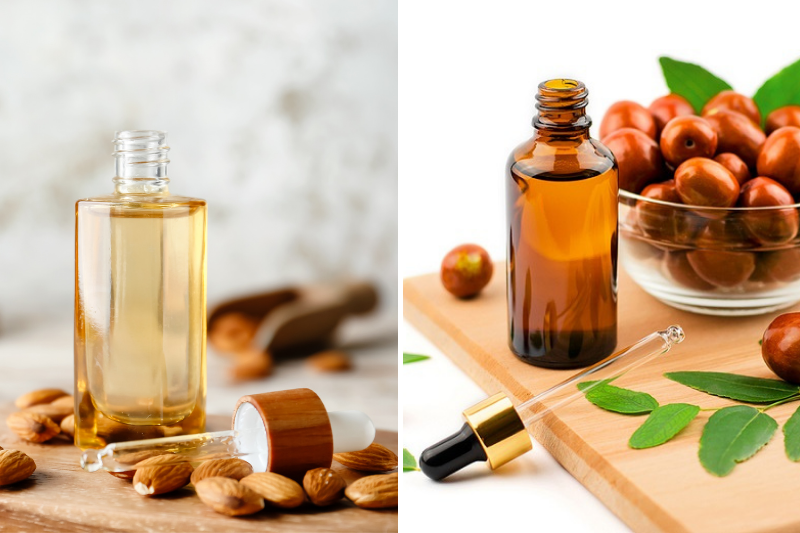
What Is Almond Oil?
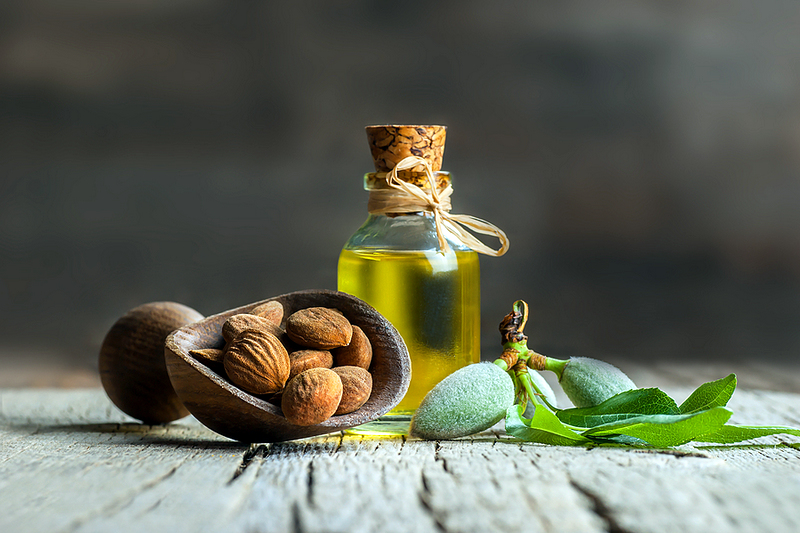
People believe that almonds are nuts, but they aren’t. They’re actually a seed that comes from the fruit of the almond tree, or Prunus dulcis.
Almonds are healthy, and people will eat them by themselves, as well as ground them into flour or milk.
Almonds are a good source of oil because they’re rich in fat. Like jojoba oil, almond oil comes in two different forms: refined and unrefined.
We create refined almond oil with high heat and harsh chemicals. Manufacturers prefer refined almond oil because it’s cheap and easy to make. This oil is good to use for cooking because it’s resistant to heat, but it is also devoid of most of its nutrients.
Extraction of unrefined almond oil occurs without any heat or chemicals. Instead, producers press the seeds, allowing the oil to keep all its nutrients. Unrefined oil is more expensive, but it has more benefits for the body.
Benefits Of Almond Oil
Almond oil is a great product that has many uses.
Almond Oil Strengthens & Moisturizes Hair
Almond oil contains nutrients such as vitamin B7. It strengthens hair, makes it softer and can help it grow back thicker.
It also forms a protective barrier over the hair surface that locks in moisture. The barrier also keeps the hair safe from heat and sun damage as well as pollution.
Almond oil also has antibacterial and anti-fungal properties. It can prevent and treat dandruff.
Almond Oil Is Great For Skin
If you have dry skin, you can use almond oil to lock in moisture. You can also use it to reduce the presence of scars and wrinkles. Best of all, it contains vitamin E which repairs damaged skin.
Read more almond oil benefits here.
What Is Jojoba Oil?
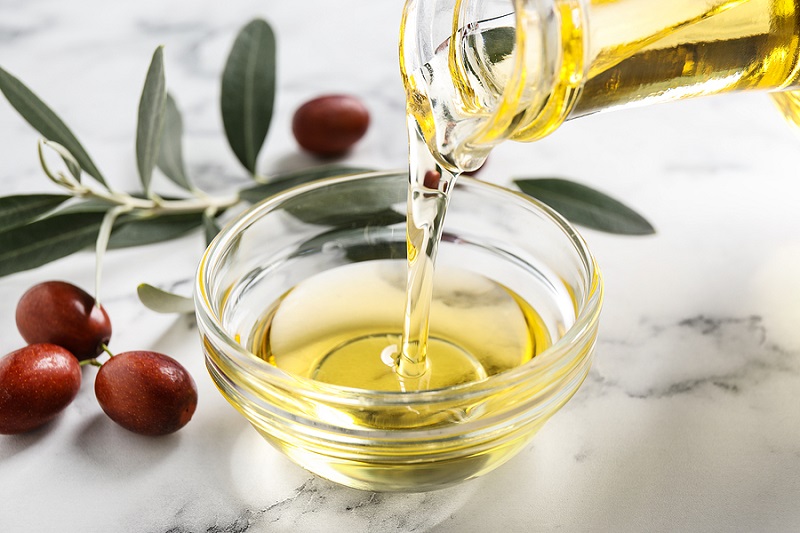
Jojoba oil comes from the seed of the jojoba plant, Simmondsia Chinensis.
Despite calling it an oil, jojoba oil is not an oil at all. Instead, it is a waxy ester. The importance of this is jojoba oil’s composition.
Because it is a waxy ester, it is almost identical in composition to sebum. Sebum is the oil that our body naturally produces. Jojoba oil mimics sebum, so is easier to treat the body.
Like almond oil, jojoba oil comes in refined and unrefined forms. Refined jojoba is also created with heat and chemicals, while unrefined jojoba is not. Unrefined jojoba oil is also better for your health.
Benefits Of Jojoba Oil
Jojoba oil has many of the same benefits as almond oil.
Jojoba Oil Is Great For Skin
Jojoba oil is a great moisturizer that works by trapping moisture in the skin. It forms a protective barrier over the skin which locks in this moisture. The barrier also protects the skin against the sun and pollution.
You can use jojoba oil to treat infections. It has antibacterial and anti-fungal properties. Because it mimics sebum, it is great for cleansing the face and reducing acne.
Jojoba oil is the perfect product for skin because it does not contain allergens and is very gentle.
Jojoba Oil Strengthens & Moisturizes Hair
Jojoba oil forms a protective barrier over hair that locks in moisture. It also protects hair from the heat, sun, chemicals, and other pollutants.
You can even use jojoba oil to treat dandruff because of its anti-fungal properties.
Read more jojoba oil benefits here.
Almond Oil Vs Jojoba Oil
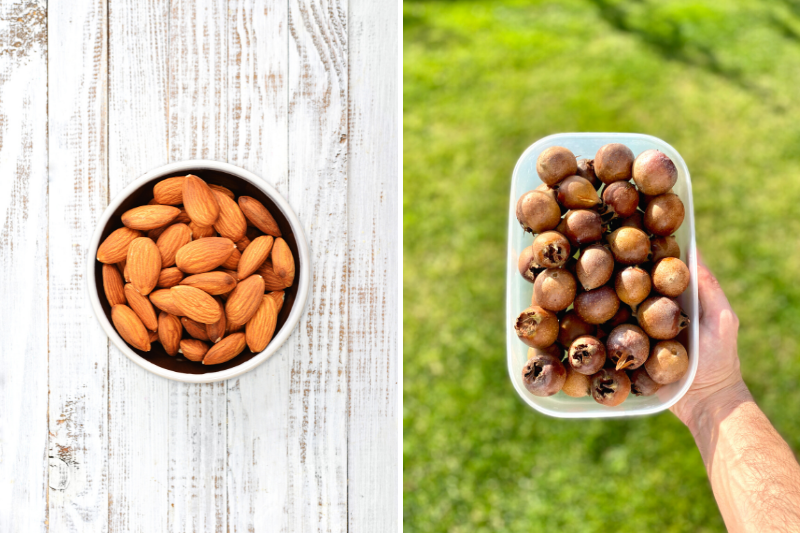
Jojoba or almond oil: which is better?
Jojoba and almond oil are very similar, so neither is really better than the other. Yet, they do have some noticeable differences. Let’s dive into those here to see which is better for each situation.
Similarities Between Jojoba Oil And Almond Oil
Of course, jojoba and almond oil are different in some ways, but they have many similarities.
They Moisturize From The Outside
Many people use oils because they penetrate the skin and moisturize deep within. Castor oil is an example of this. But, jojoba and almond oil don’t work this way.
Neither oil penetrates the skin well. They moisturize from the outside rather than the inside. They attract moisture from the surroundings and lock it into the skin.
The oils create a protective barrier over the skin. The barrier traps the moisture and keeps the skin hydrated.
They Reduce Signs Of Aging & Protect Skin
Both jojoba oil and almond oil are rich in vitamin E. . Vitamin E is an antioxidant that protects the skin from free radicals. Because of this, both oils reduce the signs of aging like wrinkles and dark spots.
They also help to heal dry or damaged skin. They promote the production of new skin cells and reduce inflammation.
They Have Anti-Fungal Properties
Both oils have antifungal properties that can treat infections of the feet.
What Are The Differences Between Jojoba And Almond Oil?
Although almond oil and jojoba oil are alike in many ways, they also have several differences.
Nut Allergies
No, almonds are not nuts, they’re actually seeds. Still, almonds are classified under the category of “tree nut” and are an allergen for many people. If you have a tree nut allergy, you should never use almond oil in your cooking or on your body.
Jojoba oil is not known to have any allergens. It’s thought to be safe for any person, and the risk of allergic reaction is very low.
Cooking
Almond oil is one of the best oils you can use for cooking because it’s exceptionally healthy.
Jojoba oil is not digestible, so you should never eat it. It can cause GI upset.
Oil Vs Wax
Almond oil is a true oil while jojoba oil is actually a waxy ester. The composition of jojoba oil is like sebum, so it tends to react better with skin.
Almond Oil Vs Jojoba Oil For Skin
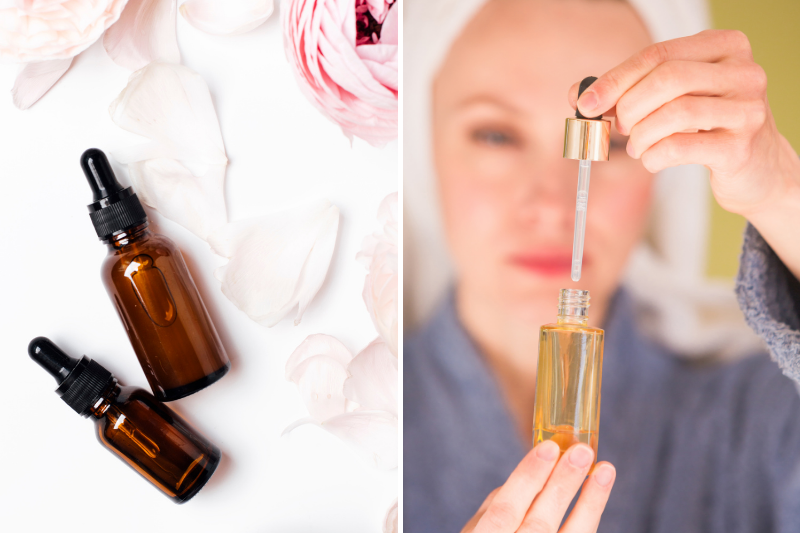
Jojoba oil is far better than almond oil for use on the skin. Almond oil isn’t bad, but you shouldn’t use it if you have sensitive skin, eczema, or psoriasis.
But, jojoba oil is very gentle. It is safe to use on even the most sensitive skin, including the face, and around the eyes.
[mv_create key=”65″ type=”recipe” title=”Jojoba And Almond Oil Mix – Moisturizer” thumbnail=”null”]
Almond Oil Vs Jojoba Oil For Face
Jojoba oil is also going to be better for the face than almond oil. As I mentioned above, almond oil isn’t great for sensitive skin, so it isn’t the best oil to use on your face (depending on your skin type).
Jojoba oil is great for use on the face because it mimics sebum. It can regulate oil production and cleanse your skin. It can also end dryness and reduce the signs of wrinkles.
Yet, if you have “normal” skin and want to give almond oil a try, you can. It has many similarities to jojoba oil. Just be sure to do a small patch test to see how your body responds.
Jojoba Oil Vs Sweet Almond Oil For Face
If you’re going to use almond oil on your face, you should only use sweet almond oil. Bitter almond oil isn’t suitable for the face.
Still, jojoba oil is better than almond oil, especially if your skin has special needs.
Sweet Almond Oil Vs Jojoba Oil For Acne
Jojoba oil and almond oil both have a comedogenic rating of “2”. This means that they are both unlikely to clog pores and cause acne.
Yet, more people have reported a problem with acne after using almond oil than when using jojoba oil. This is likely because jojoba oil mimics sebum, so your face is less likely to react to it.
[mv_create key=”66″ type=”recipe” title=”Almond Oil And Jojoba Oil Mix For Face” thumbnail=”null”]
Jojoba Oil Vs Almond Oil For Hair
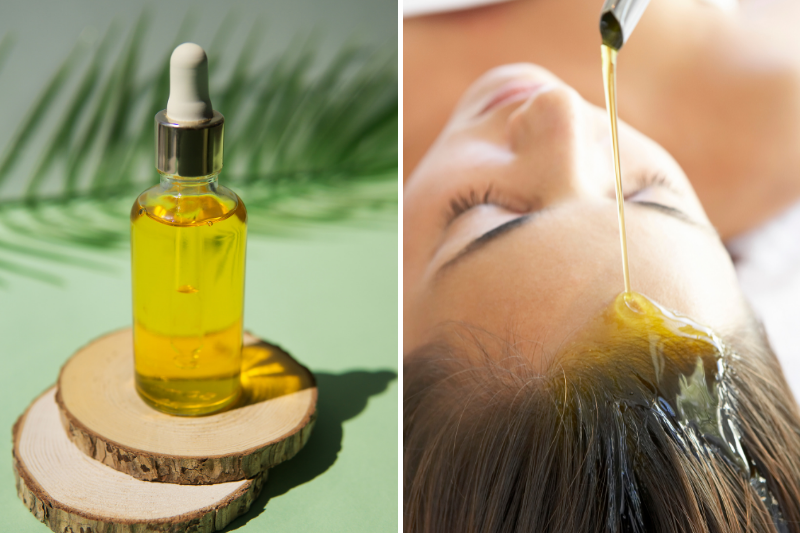
Neither jojoba nor almond oil seems to be better than the other for hair. They both contain properties that can protect your hair from sun and heat damage. They both strengthen and thicken your hair. They both reduce frizz. And, they both have antibacterial and anti-fungal properties that can treat dandruff.
If you have curly hair, jojoba oil might be better. That’s because hair uses sebum as a natural moisturizer. Curly hair tends to dry out more because the sebum cannot work its way through the curls.
Jojoba oil acts as a substitute for sebum, so when you use it to moisturize your hair, it prevents it from drying out.
Sweet Almond Oil Vs Jojoba Oil For Hair
Again, bitter almond oil should not be used on the body, so sweet almond oil is the only kind you would use for your hair. Neither sweet almond oil nor jojoba oil seems superior to the other.
How About Using An Almond Oil And Jojoba Oil Mix For Hair?
Mixing both almond oil and jojoba oil together can be a great way to get the benefits of both of these products. Here’s a recipe you can use on your hair.
[mv_create key=”67″ type=”recipe” title=”Almond Oil And Jojoba Oil Mix For Hair” thumbnail=”null”]
You can then spray over your hair and scalp as needed for added moisture.
Conclusion
So who is the winner of almond vs jojoba oil? It really depends on what you are using the jojoba and sweet almond oil for and your personal preferences.
They are both very similar, but there are a few key differences.
Jojoba oil is better for dry skin and treating acne, but they both work great for hair. Also, if you’re planning to cook, you’ll definitely want to stick with almond oil.
Find all my guides to almond products here and jojoba oil here. You can also read about exactly how to store jojoba oil here, all the great jojoba oil substitutes here, how it compares to rosehip oil here, grapeseed oil here and read everything about sweet almond oil here.


Comments are closed.